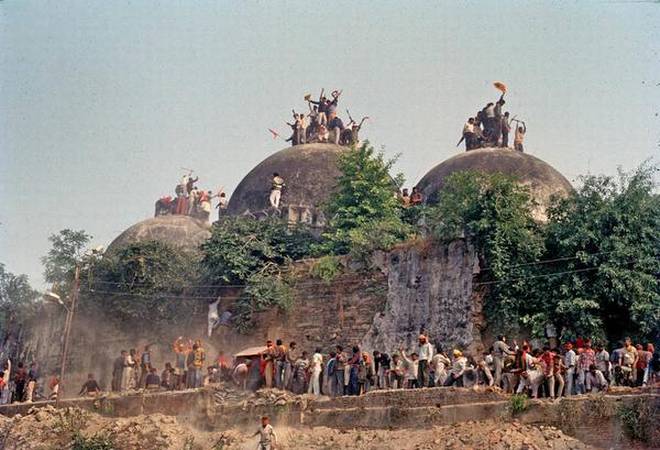
“The year was 1992. And it was Sunday, 6 December. Babri Masjid was attacked and demolished.”
Anant Bagaitkar
The above line is from an essay “Countdown to Ayodhya” by Anant Bagaitkar published in 2017 in the book Babri Masjid: 25 Years On. Bagaitkar, a journalist, gives a personal account of what he witnessed during the days leading to the demolition and riots that followed. The dispute that began 1949 as idols of Hindu gods were placed inside the mosque, eventually led to the demolition of the Masjid in 1992 by karsevaks and other Hindu groups. It sent ripples in the entire country and still continues to haunt the social and political spaces in the Indian society.
The year is 2020. It is Sunday, 6 December. It’s 28 years since the Babri Masjid was demolished.
- After a legal battle that went on for decades, the disputed land was given to the Hindu groups, for construction of Ram Temple by the apex court of India, the guardian of the Indian constitution and protector of fundamental rights. The dispute was settled in the favour of Hindu groups even as there are doubts about legality of such a decision. Ironically, the court states that the act of demolition was violation of law.
- Two months ago, in a decision by a special CBI court all the accused in the Babri demolition case, including some powerful BJP leaders such as LK Advani, Uma Bharti and Murli Manohar Joshi were acquitted of all charges.
- The process of temple construction has started at the site of Babri Mosque. On August 5 this year the Prime Minister of India participated in a religious ceremony to mark the beginning of the construction of a Ram temple at the site where Babri Masjid stood.
These bare facts convey the journey of India as it has in the last three decades moved towards right majoritarian government, and injustice has become routine.
And, Meanwhile, new strategies have been innovated for attacking the Muslim community —from lynching, to questioning their citizenship and targeting Muslim men under laws that criminalise triple talaq and conversion.
- A year ago, as the current BJP government passed the Citizenship Amendment Act and its leaders kept assuring introduction of National Register of Citizens, it laid down a more basic foundation for creating a fascist society in India and for exclusion and oppression along caste and religious lines. Ayesha Kidwai warned, as she wrote for the in Indian Cultural Forum, “The NRC-CAB is the RSS’ new Ram Janmabhoomi issue — it will last for as many years as they are in power and continue to divide the people of north India, not because Muslims will be denied citizenship instantly, but because of the social processes that have already been unleashed.”
From destruction of a physical structure and place of worship through gross violence, it has moved to envisioning more bureaucratic and sophisticated forms of violence for eliminating the Muslim and other marginalised communities.
- Law against “Love Jihad” that the Uttar Pradesh government has already introduced and some other states have proposed to introduce, criminalises conversion and punishes anyone who can be identified as responsible for conversion of a woman toin another religion for the purpose of marriage. It denies any say to women in the process and, thus, leads to undermining the agency of women to choose for themselves., Under the name of bringing laws for empowerment of women, an effective framework has been laid down to strip them of their fundamental rights of choice, expression and dignity.
No, the old methods of gross violence and attacking the places of worship have not been discarded. They are simply being implemented in a different manner.
- During the demolition of Babri Masjid one of the popular slogans was, “Yeh to kewal jhanki hai, Kashi, Mathura baaki hai (This is just a sneak peek, Varanasi and Mathura are still left).” The Akhil Bharatiya Akhara Parishad, a group of Hindu seers, is determined to “liberate” Kashi and Mathura by having temples constructed in the place of Mosques.
Kashi Corridor: A Communal Project?
The Kashi Vishwanath corridor project reeks of a communal agenda of the BJP and RSS, and the obvious target is the Gyanvapi mosque. Residents of Varanasi are fearful in anticipation of a communal flare up, similar to the demolition of Babri mosque in Ayodhya.
And the list continues….
What matters is not elaborating the long list but the message that it carries.
First, the above list shows that the demolition was not an event in the past but was a symbolic act that laid down the foundation of this future that we are witnessing. It was the first step, for the right wing groups, towards a Hindu nation.
Second, the target is not only the Muslim communities in India. Most of the policies and actions of the government that may be targeted against Muslims also impact women and other marginalised communities. We know from the experience of Assam NRC that married women had to struggle most to ‘prove’ their lineage. The recent love jihad law is an excellent example of how the BJP government’s policy will strip women of their fundamental rights. The response of the Hindu groups in the Hathras case and the apathy of the government shows that the dalit communities have no space of dignity in vision of BJP. The farmers continue to fight a battle even as they are being vilified by the media and belittled by our leaders saying that they are being “misled.” The economy of the country is in shambles and the labour laws of some states have been manipulated to exploit workers.
It won’t be long before the spectre of Hindu rashtra comes for all of us!




